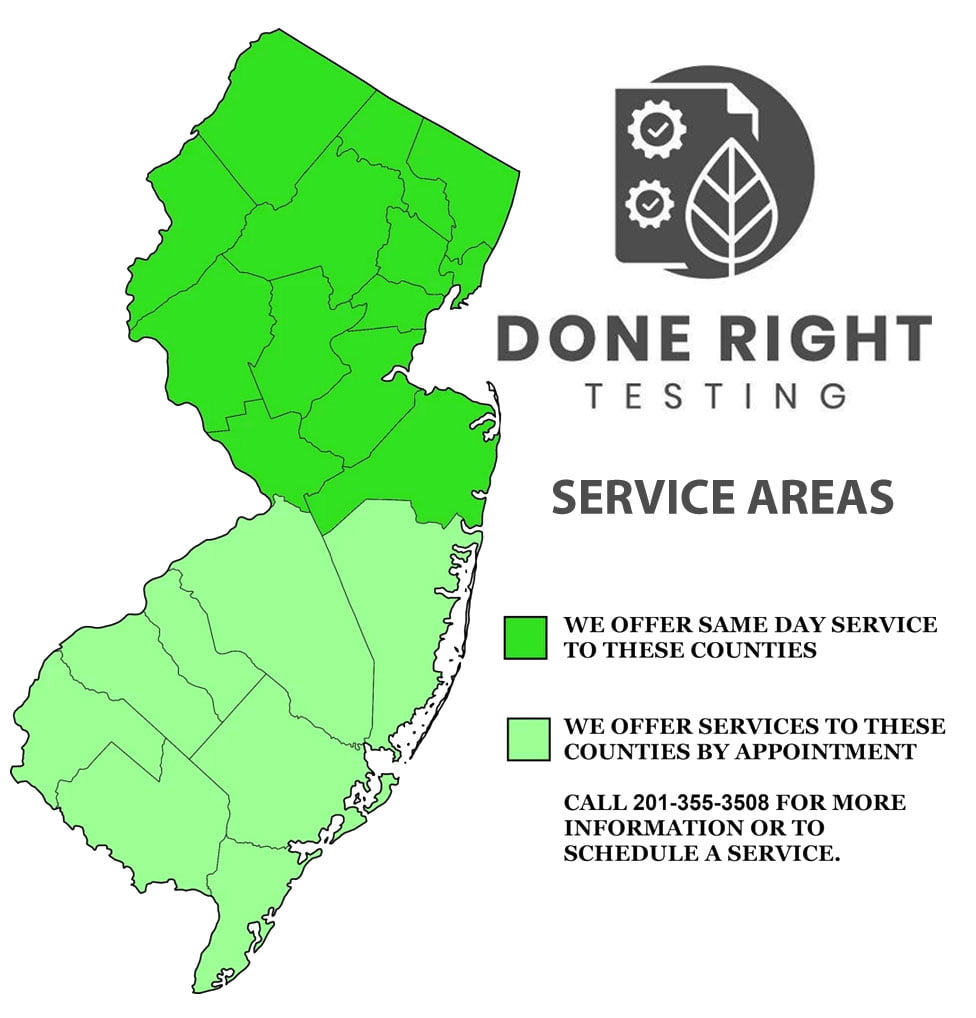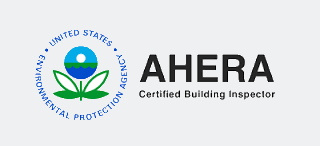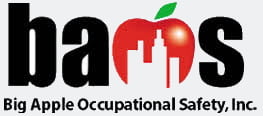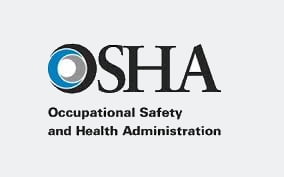Call TODAY 201-355-3508
We are able provide a wide range of mold testing and inspection methods to assess issues within a residential or commercial setting. We pride ourselves on doing what we do to the highest standards. Call us during our regular business hours. Tell us what your mold/moisture concerns are and one of our senior field technicians will email you a list of recommended services, pricing, with explanation of those services, and recommendations within 1 business day. Call us at (201)-355-3508.
Labs are not open on weekends and Holidays and this can cause delays in receiving test results. Otherwise, most mold testing we perform has a 24hr turn around time from the time it is received by the lab and up to 24hrs for us to interpret, write-up, and deliver a report with our findings.
NJ does not have a state requirement for mold sampling, inspection, or remediation. This make’s it even more important to be prudent and use companies that have a good reputation, certifications, training, and experience in the mold work being performed. At Done Right Testing our technicians defer to national/internationally recognized certifications and/or licensing from bordering states such as PA, and NY.
NJ does not have any regulation of note when it comes to mold. We go by EPA regulation.
Mold Testing or Sampling
No EPA or other federal limits have been set for mold or mold spores, sampling cannot be used to check a building’s compliance with federal mold standards. Surface sampling may be useful to determine if an area has been adequately cleaned or remediated. Sampling for mold should be conducted by professionals who have specific experience in designing mold sampling protocols, sampling methods and interpreting results. Sample analysis should follow analytical methods recommended by the American Industrial Hygiene Association (AIHA), the American Conference of Governmental Industrial Hygienists (ACGIH), or other professional organizations.
Are there federal regulations or standards regarding mold testing?
Standards or Threshold Limit Values (TLVs) for airborne concentrations of mold, or mold spores, have not been set. Currently, there are no EPA regulations or standards for airborne mold contaminants.
Ref: https://www.epa.gov/mold/mold-testing-or-sampling
Information for Renters
Renters who have mold problems in their rental space often have difficulty getting the mold problem corrected. Due to the lack of regulations, government offices have little authority to cite building owners regarding mold contamination. Renters should contact their local building code office regarding any unrepaired building leaks. When doing so, please be reminded that building code offices, like other government offices, most likely do not have mold regulations. Therefore, they will only be able to address structural deficiencies such as water leaks, plumbing issues, etc. You may also want to consider seeking legal advice regarding your rights in this situation. For more information, you can go to the New Jersey Department of Community Affairs’ Landlord-Tenant Information.
Ref: https://www.nj.gov/health/ceohs/environmental-occupational/mold/
Every person reacts differently to mold exposure. Some species cause that allergic reactions in one person may have no effect on another. Our tests can identify species present in the air and provide important identification in researching an issue.
If you have a concern about mold exposure, we recommend consulting with a medical professional.
Health Effects from Biological Contaminants
Basements are not supposed to have an odor that is musty or damp smelling. This is a sign of a moisture issue in the basement. Give us a call today at (201)-355-3508 to help us identify your moisture issues and develop a plan to fix them!
Mold growth occurs following a water buildup in your home. This can occur from things such as lack of air circulation, broken or leaky pipes, appliance failure, toilet and sewer issues, and water infiltration from the outdoors. You can learn more about the causes of mold growth by reviewing this article.
There are a lot of misconceptions about how to properly deal with mold in a home. Here are some of the common ones and facts to clarify them.
Q: Bleach is a proper way to kill mold.
A: WRONG! Bleach is an improper way to address mold growth. Mold has roots like plants do. Bleach may kill the surface growth but it will not do anything for the roots and to stop it from coming back. Mold does not lose its allergenic and toxigenic properties when it is dead, so any chemical product is insufficient. Porous materials such as wood and drywall with growth should be discarded. It should be properly removed by a professional.
Q: There was a leak in my home. I cleaned up the water with a wet-vac and put in a dehumidifier right away. Will this prevent mold growth?
A: NO! Proper dry-out is needed following the IICRC S500 standard to prevent mold growth. Following a leak, materials such as wood and drywall may feel dry to the touch after you clean the standing water up but they very likely are not. The moisture content in these materials required to grow mold is not discernable by human touch. It will feel dry to you but still will be plenty wet to have microbial growth. It is best to have a professional come in and assess the damage and then dry accordingly.
The only way to be sure whether a material contains asbestos is to have it tested by a qualified laboratory. EPA only recommends testing suspect materials if they are damaged (fraying, crumbling) or if you are planning a renovation that would disturb the suspect material. Samples should be taken by a properly trained and accredited asbestos professional (inspector).
You can perform an internet search for “asbestos contractor” and the location of your home. Contact your state to determine what state training and accreditation requirements may exist for both the contractor and their workers. EPA recommends that you use an asbestos contractor that is properly trained to handle asbestos. New Jersey’s Department of Labor has a webpage for this which you can access by clicking here.
If you have vermiculite insulation in your home, you should assume this material may be contaminated with asbestos and be aware of steps you can take to protect yourself and your family from exposure to asbestos. The EPA recommends that vermiculite insulation be left undisturbed. Airborne asbestos fibers present a health risk through inhalation, so the first step is to not disturb the material, which could release fibers into the air. The degree of health risk depends on how much and how often this occurred. If you choose to remove the vermiculite insulation, this work should be done by a trained and accredited asbestos abatement contractor that is separate and independent from the company that performed the assessment of the vermiculite insulation to avoid any conflict of interest.
Removal of the vermiculite insulation may not be necessary if it will be left undisturbed. If you choose to have the vermiculite insulation removed, the EPA recommends that you use a trained and accredited asbestos contractor that is separate and independent from the company that performed the assessment of the vermiculite insulation to avoid any conflict of interest.
We, Done Right Testing, can perform this service for you. Give us a call. Alternatively, you can perform an internet search for “asbestos inspection” or “asbestos material testing” or “asbestos testing” and the location of your home. Also, make sure that the inspector is properly trained and accredited by your state.
Anyone that performs work in homes or child-occupied facilities built before 1978 that disturbs paint must be certified by the EPA. However, they are not always required to test for lead paint before they begin work (sources one and two [page 6, question 23002-32338]).
In our experience very few do any proactive testing, or when they do, the testing is insufficient. If you request that the contractor test first, they must test all surfaces that will be effected (EPA source). Cost and concern for losing the job due to a higher bid are the primary causes we have encountered for lack of testing. The cost of properly testing depending on size of the area can become expensive. Additionally, if lead paint is found, only a company licensed to do lead paint abatement may do so, and often this can result in loss of all or some of the work that contractor was seeking to secure.
We recommend that you bring in an independent testing company such as Done Right Testing to perform the lead paint testing prior to having bids submitted for work. This will ensure unbiased results and appropriate bid submission.
If your paint is in good shape and undisturbed, it does not pose a risk to your health. However, if it is compromised and dust is released, this can be harmful. Paint chips are especially harmful if consumed, especially by children. For children, lead exposure can cause irreversible brain damage hindering development. In higher exposure levels, human beings can experience kidney and nervous system damage. In extreme cases, death and seizures can happen.
The Mayo Clinic has more information on this which is available by clicking here.
There are different variables that contribute to defining how many samples will be taken, such as square footage, locations, and color of paint. Not all old paint has lead in it, even if it was applied at the same time.
Coming soon.
VOC stands for Volatile Organic Compounds. These products can be found in hobby and building materials as well as household products (more information available from the US National Library of Health here) Motor vehicles and vessels emit volatile organic compounds which in turn can generate smog. Chemical use and combustion, wood burning for example, also produce VOCs. When VOCs like those that exhaust from our car combine with nitrogen oxides in the air they form smog.
Exposure to VOCs can have both short-term and long-term health effects on your health.
You can learn more about the effects of volatile organic compounds by clicking here.
If you think you may be experiencing a health impact from exposure, please consult with your primary care physician for further guidance.
They can come from a multitude of different places. For example, some of these places are solvents, paints, adhesives, cleaners, disinfectants, air fresheners, cigarettes, cooking, building materials, sewer gas, from a vehicle, and permeation into the home from the outdoors.
We mostly perform testing for VOCs using a TO-15 Canister as displayed in the VOCs Service section of our website. Most of the time, the canister will be left in the affected area for 24hrs to collect the sample.
We will provide you a full copy of the test results and the relevant reference material about each item on the results. Our tests should be used as part of your research.
If you think you may be experiencing a health impact from exposure to something in the results, please consult with your primary care physician for further guidance.
This answer is largely predicated on what the test results show. There are options that range from simply opening windows in the home and creating a cross-breeze, ventilating the home with equipment, air purifiers, discontinuing use of products that may be contributing to elevated levels, removing problematic building materials such as flooring, flooring adhesive, drywall, correcting drain issues, and addressing inadequate ventilation in the home.
The proper course of remediating VOCs should be determined by a professional.
Our rates for service vary depending on the scope of job and the types of testing required. Our services start at $325.
We accept credit cards (American Express, Discover, Visa, MasterCard), check, and bank transfer. We do NOT accept cash at this time.
Depending on the day, we often can provide same day service calls during business hours. Most days, we are able to provide next business day service.

What sets Done Right Testing apart from other testing companies is our ability to get on site quickly to collect our samples. We pride ourselves on offering same or next business day turnaround on most jobs.

Done Right Testing has no conflict of interests as we only provide testing services and do not try to sell you remediation services. You can be sure that you are getting unbiased, honest testing results that you can save you money.

We employ experienced IICRC technicians to ensure mold scopes meet the standard of work you should have followed to safely take care of your home. Rest assured that tests are performed by qualified technicians only.
Same Day Service is available to North and Central New Jersey. Offering services to Southern New Jersey by appointment only. Our lab performs next day turnaround for our samples which allows us to get results to you within 48 hours of our visit to your location.

Call, Email, or Fill Out the Form Below to setup your complimentary consultation. We look forward to answering any questions you may have.
Done Right Testing is a leading Asbestos Inspector that provides Asbestos Inspections and Asbestos Testing in Newark NJ, Jersey City NJ, Bayonne NJ, Linden NJ, Irvington NJ, Ridgewood NJ, Franklin Lakes NJ, Paramus NJ, Saddle River NJ, Essex Fells NJ, Alpine NJ, Millburn NJ, Rumson NJ, Summit NJ, Bernards Township NJ, Princeton NJ, Chatham NJ, Tenafly NJ, Warren Township NJ, Wyckoff NJ, Montgomery Township NJ, South Orange NJ, Verona NJ, East Windsor NJ, West Windsor NJ, Princeton NJ, Laurence Harbor NJ, Keansburg NJ, Keyport NJ, Sayreville NJ and surrounding areas.
Read the wonderful things our clients have to say about Done Right Testing.












Appointment available by request outside of the below office hours, please call the office.
Monday-Friday:
9AM – 5PM
Appointment available by request outside of these hours, please call the office.
Appointment available by request outside of the below office hours, please call the office.
Monday-Friday:
9AM – 5PM